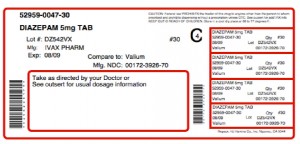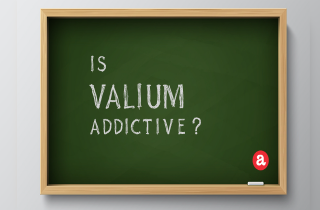ARTICLE OVERVIEW: Yes, Valium is addictive. If you’re taking Valium as directed by your doctor, you probably won’t get addicted to Valium. But if you’re taking larger doses than prescribed to try to “get high” then you’re misusing the drug, which is more likely to cause an addiction.
TABLE OF CONTENTS
- Psychoactive Ingredients
- Main Uses
- Addictive Potential
- How Do You Get Addicted?
- Dependence or Addiction
- Do I Have a Problem?
- What Next?
Psychoactive Ingredients
The active ingredient in Valium is a synthetic substance called diazepam, created in a lab. Diazepam is a benzodiazepine medication and comes from the benzo family of drugs, known for being habit-forming. Diazepam can make you feel high. But when you take Valium to get high, you increase risk for addiction. Still, Valium has a fairly low addiction potential when taken as prescribed for the period of a few weeks, or less.
In fact, the U.S. Drug Enforcement Administration classifies Valium as a Schedule IV narcotic. This means that Valium is less addictive than other drugs. In fact, it is considered a relatively safe medication, unless taken in conjunction with alcohol or another central nervous system depressant.
Main Uses
Introduced in the early 60s as a tranquilizer and treatment for anxiety, Valium spread like wildfire; it soon became one of the most prescribed medications in the U.S. Valium (diazepam) is used to deal with many health conditions such as:
- treating anxiety disorders
- muscle spasms
- alcohol withdrawal
- treating sleep disorders
- seizures
- restless leg syndrome
Valium helps relax the brain and body. When taken as prescribed, Valium can offer relief from symptoms throughout the day. But calming effects have a dark side; Valium is a common drug of abuse because it is so effective. Moreover, when you take Valium to try to achieve a euphoric high or mix it with other drugs, Valium can become addictive.

The Addictive Potential Of Valium
Valium is very addictive, so it’s usually only prescribed for short-term use and in small doses. Its strong effects on the central nervous system cause it to be frequently abused, making it illegal to use this drug without a prescription. The safe Valium dose is between 4-40 mg daily. But how addictive a drug is doesn’t just depend on its chemical properties. Social and cultural factors also heavily influence the availability of Valium. Some other factors which make this drug so easy to get addicted to are:
- Attitudes of doctors prescribing Valium
- Valium availability
- Valium’s illegal diversion history
- State laws or local controls on Valium
- Widespread awareness of Valium action
Dependence or Addiction
You can be dependent on Valium without becoming addicted to it. Someone using Valium to treat their anxiety, for instance, may have trouble getting through the day without it because of illness, or may experience withdrawal effects if they stop taking Valium. But this isn’t the same as an addition.
Valium addiction involves a psychological compulsion to seek out the drug, despite negative consequences of continued Valium abuse. In other words, if you use Valium to get high, avoid psychological or emotional issues, or compulsively use Valium, you could be a Valium addict.
If you become dependent on Valium, you need to slowly reduce doses over time when you quit. How can you quit Valium safely? The Aston Manual provides you with simple tapering schedule from Valium.
How Do You Get Addicted?
It is possible for you to get addicted to Valium even if you take it exactly as prescribed. It’s far less likely that you’ll get addicted this way, however.You should use Valium only as prescribed by a doctor, and keep in mind that long-term use of Valium may not be effective for your condition. Further, it is not known if Valium is safe and effective for use for a period longer than 4 months. The FDA Valium label warns that benzodiazepines like diazepam are usually used for short periods of time because of their addictive potential and rebound adverse effects.
On the other hand, if you make a conscious decision to misuse the medication, it’s very likely you’ll become addicted. Moreover, you’re at a higher risk of Valium addiction if you’ve been addicted to other drugs or alcohol in the past. Some ways that increase your chances of becoming addicted include:
- Chewing Valium to prevent controlled release.
- Crushing Valium into a powder and snorting Valium.
- Crushing Valium to dissolve in water and inject.
- Taking Valium in higher doses than prescribed.
- Taking Valium more frequently than prescribed.
Despite all public effort to raise awareness of the possible dangers of long-term use of Valium, this medication is still one of the most wildly used in the US. A 2015 article published in JAMA Psychiatry about U.S. benzo use reports that in 2008, approximately 5.2 % of Americans aged 18-80 used benzodiazepine like Valium. This percentage increased with age from 2.6% (18-35 years) to 5.4% (36-50 years) to 7.4% (51-64 years) to 8.7% (65-80 years).
Do I have a problem?
Valium dependence and addiction can be hard to tell apart. Valium addiction causes intense cravings for the drug, and leaves a person with the feeling that he or she can’t live without taking it. But how can you distinguish between a drug craving and withdrawal?
The National Institute of Drug Abuse defines addiction like this:
Addiction is a chronic disease characterized by drug seeking and use that is compulsive, or difficult to control, despite harmful consequences.
Basically, this means that people who have a Valium problem can stop using the drug…but can’t stay stopped. Addiction compels you to use your drug-of-choice again and again. In other words, you may be addicted to Valium if you need to take it to deal with normal emotional and mental stresses in daily life.
Other signs of Valium addiction include:
- Continued Valium abuse despite negative consequences.
- Craving Valium and using it compulsively.
- Seeking Valium in order to stimulate the “reward center” of the brain.
- Difficulty functioning on a daily basis without the drug.
- Taking prescription drugs from family members or friends.
- Visiting multiple doctors, forging prescriptions, or accidentally losing prescriptions in order to get more medication.
- Isolation from family and friends.
- Neglecting former friends or favorite hobbies.
If you notice any of the above, don’t lose hope: addiction is treatable medical condition. You should not feel ashamed for having an addiction problems. Just reach out for help!
What next?
STEP #1: Accept the fact that you have a problem. The path to addiction recovery starts when you admit that you have a problem. There is no longer shame associated with addiction. It is a medical condition. But, you must first accept that you’re in over your head. Then, be honest about all the negative effects that addiction has on you, your friends, and family. Honesty is the first step.
STEP #2: Devote yourself to change. Then, motivate yourself to address the addiction. Find a reason to quit. YOU are the only one that can change your life for the better. The process is very much internal. So, commit to a change and then move forward.
STEP #3: Seek help. When you are ready to quit, don’t wait any longer, just reach out for help. You are not alone, there are many people who struggle with addiction to benzodiazepines. Hundreds of thousands of people are just like you. You can seek help from any of these medical professionals who can help you diagnose substance abuse disorder:
- Licensed Clinical Psychologists
- Psychiatrists
- Medical Doctors (who specialize in addiction)
- Treatment Centers for Addiction
Got any questions?
Do you still have questions about Valium addiction potential? Please leave them here. We are happy to help answer your questions personally and promptly. If we do not know the answer to your particular question, we will refer you to someone who does.










Related Posts